Can Hong Kong get rid of its atrocious subdivided flats anytime soon?
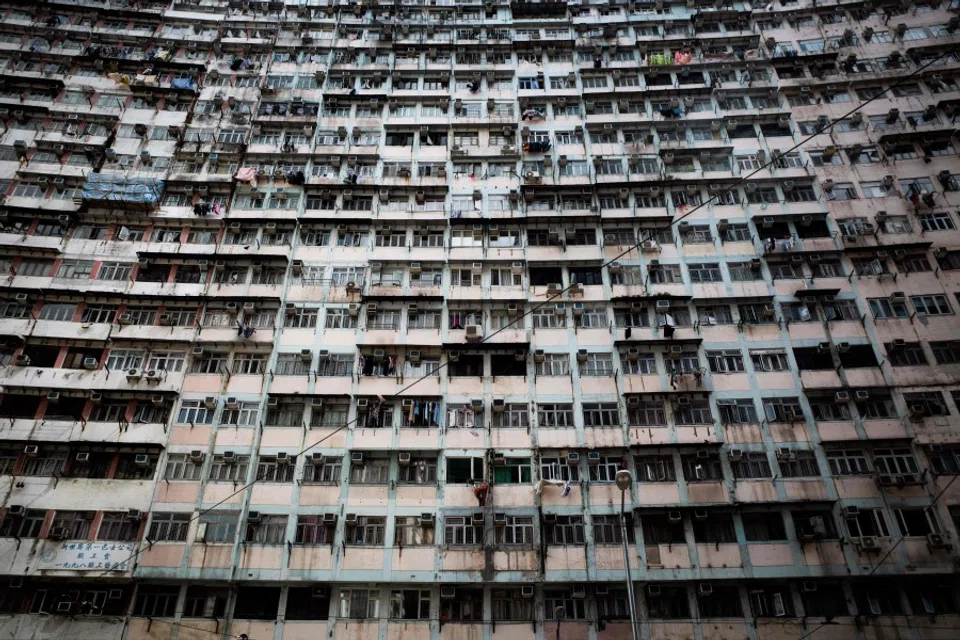
In recent years, as Hong Kong's property prices continued to climb, many of the SAR's grassroot residents turned to subdivided flats (劏房 in Cantonese, meaning "butchered room"). Ms Ng, a single mother of three, lives in a subdivided flat in the old district of Mong Kok. Her unit is no larger than 100 square feet (9.29 square metres).
One evening earlier this month, I interviewed Ng at her flat. As she opened the door, I saw that daily necessities filled the small room, and two bunk beds were all the living space they had. This family of four lived and dined within this confined area.
Although the subdivided flat is tiny, the rent is high. Ng has been living here for the last four years. On account of her raising three kids alone, her landlord charges her HK$5,600 per month (S$980) and has never raised the rent. But Ng lives off supplementary payments from the Comprehensive Social Security Assistance Scheme which amount to HK$15,000 per month. Her rent is her biggest burden. She sighed, "My youngest son still needs to be taken care of and I can't work at all. I don't know what to do."
Landlords do not care about repair work
This temporary "home" is not only tiny but also in bad condition. Large water marks are visible on the ceiling and walls, and the bed frame pushed against the wall has already turned mouldy. Ng is worried that the mattress will be the next to give way. Recently, as the water seepage issue became worse, she asked her landlord for help several times but to no avail. She is disheartened that the property owner only wants to collect rent but does not bother with maintenance.
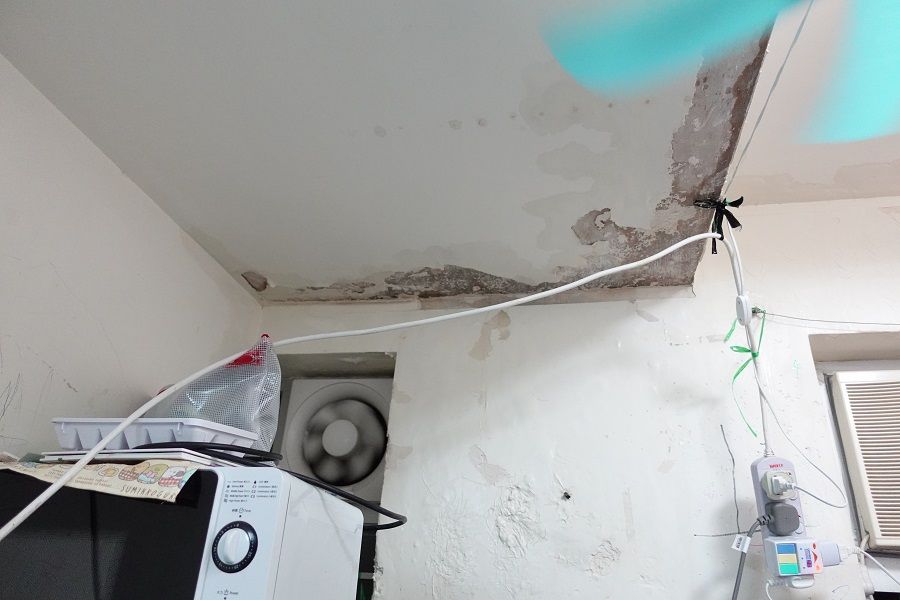
More worrying is the fact that her two older daughters are hitting puberty but there is no privacy at home. She said, "Their brother is a boy after all. Sometimes when my daughters need to rush to school, they don't have a place to change their clothes."
Ng sobbed a few times during the interview when we talked about her need to raise the family alone. She asked, "Will our days get better when we have the chance to stay in public housing?"
According to its March report, over 226,000 people live in subdivided flats, some 16,000 more people than in 2016.
Everyone wants to have a roof over their heads and a job that they enjoy. But in the small city of Hong Kong, tiny yet expensive living apartments are a way of life. In the early 1990s, the United Nations Commission on Human Rights called Hong Kong's cage homes (comprising beds enclosed by metal cages and lived in by some of Hong Kong's poorest) an "insult to human dignity".
But before these cage homes could be demolished, subdivided flats (residential units that are further divided into smaller units for rent) emerged in Hong Kong's property market for low-income families or individuals to live in.
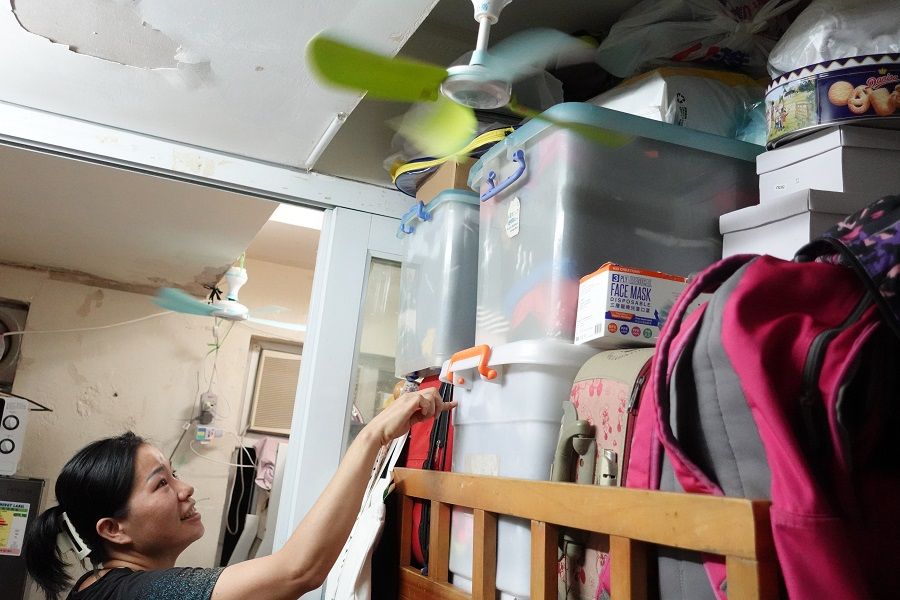
Between 2005 and 2012 when Donald Tsang was Hong Kong's chief executive, the long-term reduction in land supply and new houses being built resulted in a housing shortage that pushed up property prices. Many ordinary residents who had not been allocated public housing were only able to rent tiny subdivided flats, resulting in a surge in demand for such flats.
Over the past five years, Hong Kong's property prices have soared and the number of subdivided flats has been on the rise. Earlier on, Hong Kong established a task force for the study on tenancy control of subdivided flats. According to its March report, over 226,000 people live in subdivided flats, some 16,000 more people than in 2016. Among them, over 60% of residents are aged between 25 and 64.
The report also found that the majority of people living in subdivided flats are low-income households, with a median monthly household income of HK$15,000, which is way lower than the median monthly household income of HK$33,000 of all domestic households in the fourth quarter of 2020.
In terms of the size of subdivided flats, the median per capita floor area of accommodation is only 6.6 square metres, or 71 square feet. Roughly half of all subdivided flats are only approximately 123 square feet in size (11.43 square metres), and over 20% of subdivided flats are less than 75 square feet (6.97 square metres) in floor area.
Poor hygiene conditions, natural lighting and ventilation
Subdivided flats are terrible places to live in because they are not only small but also have poor hygiene conditions. For example, people living in these flats have to share the toilet or kitchen with other tenants. Additionally, many subdivided flats do not have windows for natural lighting and ventilation as mandated in the Buildings Ordinance.
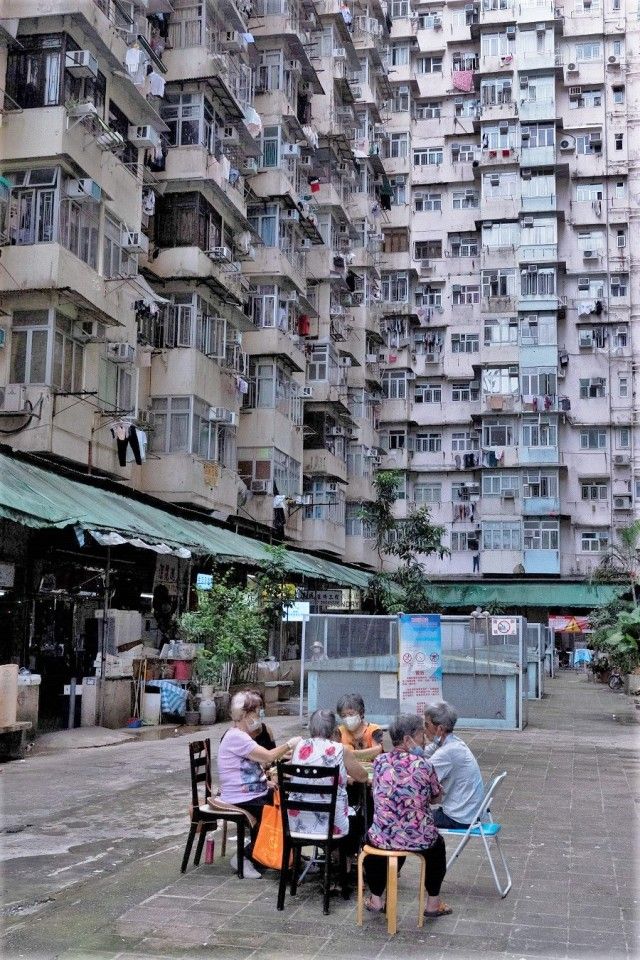
According to a report released on 22 July by Concerning Grassroots' Housing Rights Alliance, a non-governmental organisation, nearly 20% of subdivided flat tenants either do not have or cannot use windows. Of the remaining tenants, only 36.5% have access to one window.
This summer, the organisation visited 103 subdivided flats and found that 47.6% of the flats had temperature readings of above 30 degrees Celsius. Going by medical research stating that 24 degrees Celsius is the optimal room temperature for humans, the indoor temperature of subdivided flats is unsuitable for humans to live in. The report also stated that, because of the warm weather, nearly 50% of respondents were unwilling to stay home due to worsening living conditions and increasing mental stress.
In a report published by the Kwai Chung Subdivided Flats Residents Alliance in July, 73% of interviewed subdivided flat tenants responded that they suffer from moderate to severe depression, nearly three times more than the number of residents living in public housing who suffer from mental illnesses.
Mr Wong is a classic example. He lives alone in a 50-square-foot subdivided flat in the Prince Edward district. As a retiree with no income, he cooks his own meals at home everyday. But because ventilation is poor, during the summer, the flat becomes very stuffy and he badly needs air conditioning or a few fans to drive away the heat.
Wong has been staying in his subdivided flat for five years and his health has been deteriorating. He often develops skin rashes as well. Now, he strolls around air-conditioned malls from the afternoon to night every day and hopes that the Hong Kong government will solve the housing issue soon.
Harsh living conditions affect tenants' mental health
In fact, the harsh living conditions of subdivided flats often affect tenant's mental health. In a report published by the Kwai Chung Subdivided Flats Residents Alliance in July, 73% of interviewed subdivided flat tenants responded that they suffer from moderate to severe depression, nearly three times more than the number of residents living in public housing who suffer from mental illnesses.
Additionally, while living conditions are terrible in subdivided flats, this does not mean that the rent is affordable. The same report also found that the average monthly rent of subdivided flats can be as high as HK$4,932. Compared with figures from six years ago, this is an increase of 35.9%, and more than double the 17% increase in household income over the same period. Some tenants also worry that they would encounter landlords who frequently raise the rent if they move out of their subdivided flat and are thus left with no choice but to bear with these harsh conditions.
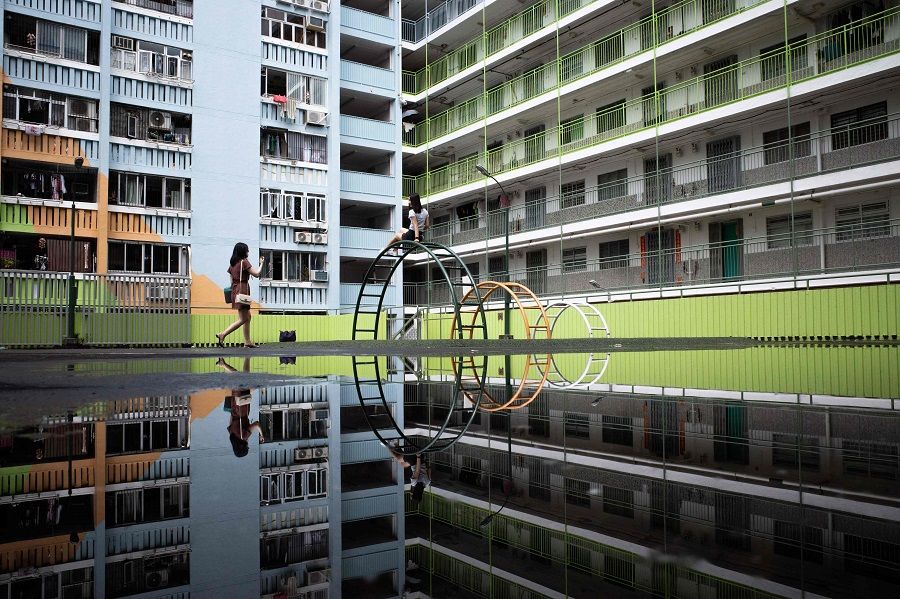
To address the worsening issue of subdivided flats, the Hong Kong government has also taken measures in recent years to try and ease housing pressure on the ground, but it has been difficult and the effects are not yet seen. This year, the authorities announced that it would partner non-profit organisations to provide subsidised rental of 800 rooms at hotels and guest houses as transitional accommodation for residents waiting for public flats in a scheme lasting three years.
However, an organisation shared that the Hong Kong government requires participating hotels and guest houses to offer at least a two-year lease. Although the authorities started allowing annual leases for most guest houses from last year, many guest houses that initially wanted to participate have dropped the idea.
The Hong Kong government has also indicated that it intends to regulate the rental fees for subdivided flats. On 14 July, the Transport and Housing Bureau submitted to the Legislative Council a draft bill to provide protected tenure of four years to tenants of subdivided units. Landlords will not be allowed to overcharge tenants on utilities, and there will be a cap of 15% on annual rental raises. The bill could be implemented within the year.
However, many property owners have objected to the Hong Kong government's regulatory policies for subdivided units, saying that the policies go against the free market system and would lead to an imbalance of market demand and supply.
Land policies do not solve old problems; housing issues top people's complaints
In the 24 years since Hong Kong was returned to China, the land policies of the SAR government have not stemmed the deterioration of the housing issue, making it the most problematic bread and butter issue in recent years. At a conference of the Chinese Association of Hong Kong & Macao Studies in July, Hong Kong and Macau Affairs Office director Xia Baolong outlined four expectations of the central government for Hong Kong, including having no more subdivided flats and cage homes by 2049.
Xia said: "Imagine what progress the 'one country, two systems' will achieve in Hong Kong when our country realizes the second centenary goal? We expect Hong Kong's economy to be more prosperous, with more balanced growth across sectors and a more harmonious and peaceful society. In particular, the housing problem that we are worried about now will be greatly improved, and we will bid farewell to subdivided flats and cage homes."
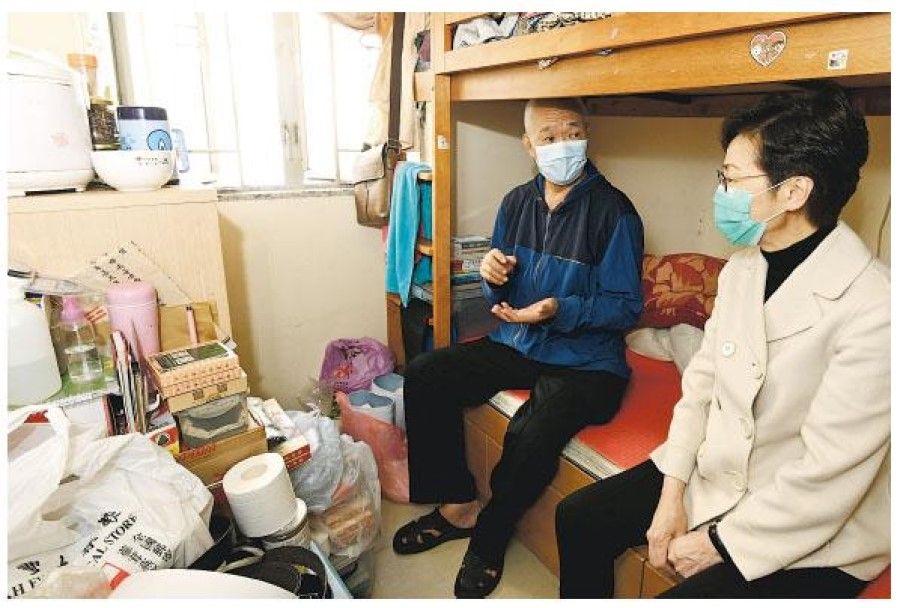
Xia's comments drew major reactions and agreement in Hong Kong. Many residents of subdivided flats and cage homes said they hope to see such lodgings disappear during their lifetime so that later generations will not have to suffer. Some in the political arena said Xia's expectations are not just a mission for Hong Kong's chief executive, but something asked of all "patriots" involved in governance.
"I'm more pessimistic about that. Unless there is a major policy change or a sudden shift in the market environment, it will be difficult for Hong Kong to get rid of subdivided flats." - Yip Ngai Ming, Department of Public Policy, City University of Hong Kong
Unequal income distribution and unaffordable housing prices lead to worse rentals
Yip Ngai Ming of the Department of Public Policy at City University of Hong Kong (CityU) is a member of the Task Force for the Study on Tenancy Control of Subdivided Units. Speaking to Hong Kong media, he said subdivided flats surfaced in Hong Kong because incomes are seriously unequal and housing prices became unaffordable for the average income, so that people could only settle in worse lodgings as they continued renting.
Also, quantitative easing policy outside of Hong Kong has led to a huge inflow of foreign funds pushing up Hong Kong's property market. With no vacancy tax levied on property owners, the tight supply in the housing market and rising rental issues have only gotten worse.
But in response to Xia's comment about having no more subdivided flats, Prof Yip said frankly: "I'm more pessimistic about that. Unless there is a major policy change or a sudden shift in the market environment, it will be difficult for Hong Kong to get rid of subdivided flats."
Chartered surveyor Kenny Siu also told Zaobao that there are two main views in Hong Kong on subdivided flats - either believing that there can be zero subdivided flats, or that they are here to stay. He said: "Figures show that there are about 90,000 subdivided flats in Hong Kong, and going by the current rate of 10,000 new residential units each year, even if all the new flats went to residents of subdivided flats, the issue would only be completely resolved in nine years."
Siu said from this perspective, while central government leaders have good intentions in declaring their aim to resolve Hong Kong's housing problems, it is practically impossible to get subdivided flats down to zero in the short term. The priority for the Hong Kong government is to face reality and concretise how to resolve the issue of subdivided flats, and set a target to reduce the number of tenants each year.
"For an international city like Hong Kong, this is very sad. Even as the authorities resolve the issue of subdivided flats, it also needs to improve such flats so that there are no flats from hell." - Kenny Siu, Chartered surveyor
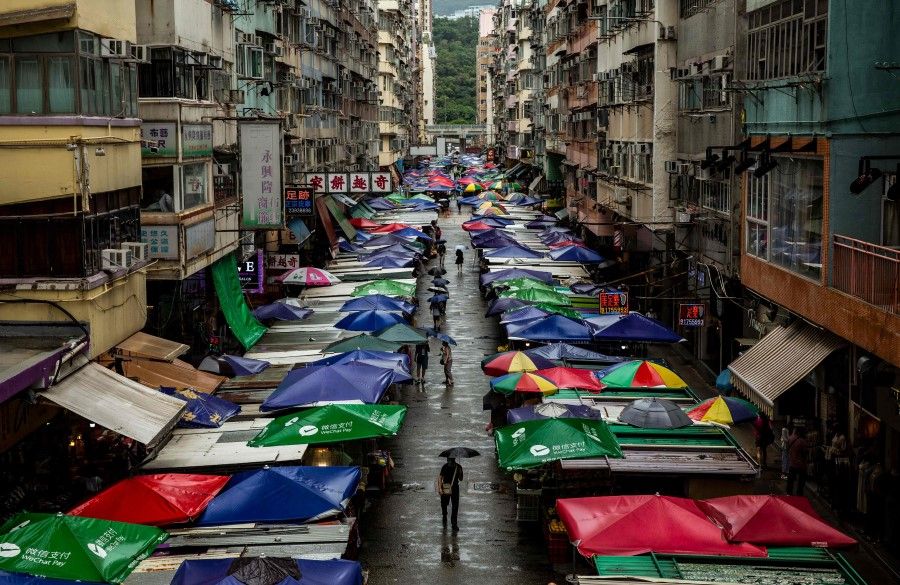
He lamented that the housing issue has been plaguing Hong Kong in recent years, with many Hong Kongers living in subdivided flats smaller than a prison cell. "For an international city like Hong Kong, this is very sad. Even as the authorities resolve the issue of subdivided flats, it also needs to improve such flats so that there are no flats from hell."
Siu also felt that the current process for increasing land supply in Hong Kong is very slow, and in the long term, if the authorities want to step up on easing the housing problem, it will have to shorten the process for approving applications to put land on the market.
Opening up land and increasing supply of public housing is the way to go
Hong Kong Housing Authority member and Federation of Public Housing Estates executive director Anthony Chiu told Zaobao that people could move into public housing to resolve housing issues, but there has been a serious lack of land supply in Hong Kong in recent years and it is difficult to find land to build housing, and many Hong Kongers can only live in subdivided flats. In the long term, opening up land and increasing the supply of public housing is the fundamental solution to Hong Kong's issue of subdivided flats.
However, while the Long Term Housing Strategy released by the Hong Kong government at the end of 2020 said there was enough land to build 316,000 public housing units over the next ten years, an optimistic estimate is that supply will only increase in the five years from 2026/2027, when the waiting period for public housing will get better.
Chiu said: "The housing problem is now the top bread and butter issue in Hong Kong; it has become a political issue and there is a lot of public resentment. We hope the Hong Kong government will take this seriously and ramp up supply of land, to ease anger among Hong Kongers."
